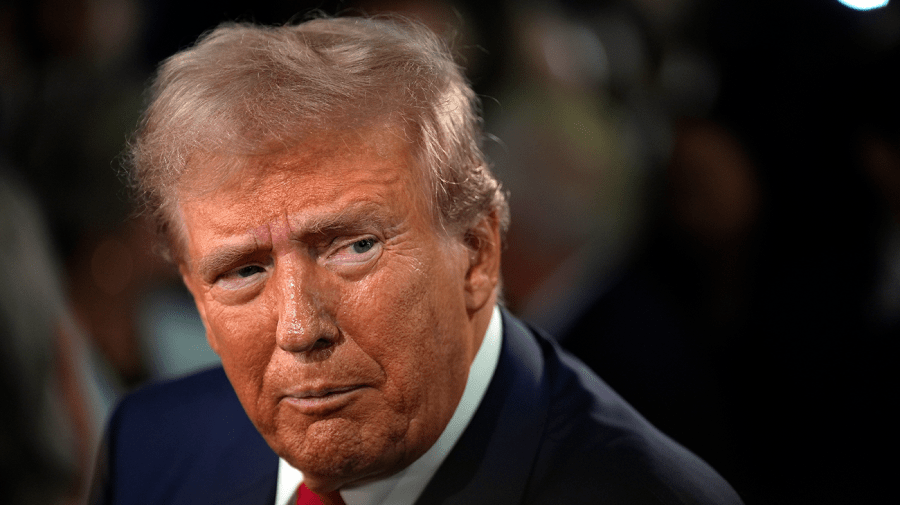Former President Trump stumbled on health care during his debate against Vice President Harris, delivering vague and sometimes conflicting answers on abortion and his plans for the Affordable Care Act (ACA).
The performance illustrated how the ACA, also known as ObamaCare, in particular has haunted Trump. It also put his shifting stances on abortion — one of the critical issues in the race — under an even hotter spotlight.
During Tuesday’s debate, Trump was noncommittal about his plans on both subjects.
The former president “absolutely stepped on every possible land mine in both of those,” Republican strategist Chuck Coughlin said.
On ObamaCare, Trump indicated that he might want to try to repeal the law again but also didn’t commit to having a plan to replace it.
He called the law “lousy” but grudgingly promised to run it “as good as it can be run” unless and until there’s a better and cheaper option.
“It’s still never going to be great,” Trump said. “If we can come up with a plan that’s going to cost our people, our population less money and be better health care than ObamaCare, then I would absolutely do it. … We could do much better than ObamaCare.”
Almost as soon as the law was passed in 2010, it became a political albatross for Democrats. It cost them control of the House and Senate, and eventually the presidency as Trump won the White House in 2016 on a pledge to “repeal and replace” the health law.
But after Trump and congressional Republicans failed to repeal the law in 2017 by a single vote, its popularity soared. Democrats won back control of the House in the 2018 midterms by campaigning on protecting preexisting conditions.
When Trump was elected in November 2016, just 43 percent of adults supported ObamaCare, according to a tracking poll conducted by the nonpartisan health research group KFF. The most recent poll published in May showed 62 percent view the law favorably.
During the debate, in one of many moments where she sought to bait Trump into losing his temper and going off track, Harris recalled the moment then-Sen. John McCain (R-Ariz.) voted against the GOP bill in a dramatic late-night vote. McCain, along with Sens. Susan Collins (R-Maine) and Lisa Murkowski (R-Alaska), gave Democrats the three Republican votes needed to preserve the law.
“The late great John McCain ― I will never forget that night ― walked onto the Senate floor and said, ‘No you don’t,’” Harris said.
Democrats now say they want to build on the law and strengthen it, even though some prominent members of the party — including Harris — embraced single payer “Medicare for All” during the 2020 presidential campaign.
When pressed by the debate moderators, Trump acknowledged that he doesn’t currently have a plan to replace ObamaCare if it were repealed.
“I have concepts of a plan. I’m not president right now,” Trump said.
Arizona-based Coughlin said Trump’s comments were revealing.
“I think it spoke to the reason McCain gave the thumbs down is they never had an alternative plan. He was just repeal. It wasn’t repeal and replace. They didn’t ever have a plan to replace it with,” Coughlin said.
Trump has never been specific about how he’d replace health coverage for tens of millions of Americans.
In 2015, he promised to replace it “with something terrific.” In 2016, he said “it’ll be great health care for much less money.” In 2017, he said “we’re going to have insurance for everybody.”
Most Republicans have said they’re not interested in trying to repeal the law again, even if they regain control of the White House and Senate next year.
A GOP strategist also suggested Trump’s ego may prevent him from dragging his name through another round of losing a fight against ObamaCare.
Democrats are leaning on health care issues this election. Polls show voters want to hear about plans to lower health costs, and Democratic groups are painting Trump as an “existential threat” to drive voters to the polls.
The Democratic-aligned group Protect Our Care said voters should understand that just because Trump doesn’t have a plan doesn’t mean he won’t try to take away people’s health coverage.
“His ‘concepts of a plan’ comment is easily mocked, but the stakes couldn’t be more dire for health care,” said Leslie Dach, the group’s founder and chair. “His record speaks for itself: he will stop at nothing to gut the ACA and its core protections, which puts millions of Americans at risk of losing their coverage and paying thousands of dollars more for their health care. Health care is once again on the ballot in November.”
Even if Trump doesn’t try to outright replace ObamaCare, he could target it to offset his promise of trillions of dollars in tax cuts as well as his pledge to slash trillions in federal spending.
On abortion, Trump’s ever-shifting positions were on full display as Harris tried to pin him on the issue.
He danced around the issue of potentially vetoing a national abortion ban, repeated a debunked claim about Democrats wanting to “execute” babies after birth, and falsely claimed that Democrats wanted to overturn Roe as much as Republicans did.
“As far as the abortion ban, no, I’m not in favor of abortion ban,” Trump said when asked directly about the possibility of a veto. “But it doesn’t matter because this issue has now been taken over by the states.”
But Trump did not commit to vetoing a ban if it reached his desk at the White House, and he rebutted his own vice presidential pick, Sen. JD Vance (R-Ohio), who last month said Trump “explicitly” told him he would veto a national ban.
“I didn’t discuss it with JD, in all fairness,” Trump said. “And I don’t mind if he has a certain view, but I don’t think he was speaking for me.”
The remarks were part of a pattern for Trump, who is keenly aware of the political liabilities of taking a firm stance on abortion. Trump, who appointed three justices to the Supreme Court who voted to overturn Roe v. Wade, has tried to maintain an ambiguous position on abortion for fear of losing support from religious conservatives or losing ground from the center.
Trump is also facing an increasingly wide gender gap, as polls suggest women prefer Harris, and Trump’s efforts to close that divide don’t seem to be working.
Trump has bragged about his role in overturning Roe v. Wade but said it was something everyone wanted. This past spring, he seemed to eventually settle on a talking point of letting states decide abortion.
In so doing, he’s taken criticism from all sides — but Trump and his advisers have also taken the calculated gamble the religious right won’t abandon him because they have nowhere else to go.
After the debate, Vance tried to salvage the veto answer, telling CNN and ABC in separate interviews that Trump opposes a national ban and rejected the hypothetical premise of the question.
But Vance never reiterated his previous statement about a Trump veto.
Abortion is banned or restricted in nearly two dozen states, and Harris on Tuesday repeatedly referred to the current patchwork of laws as “Trump abortion bans.”
“The government, and Donald Trump certainly, should not be telling a woman what to do with her body,” Harris said.
At the debate, Trump again tied himself in knots, said Republican consultant Keith Naughton.
“Trump failed on abortion because he talked for so long about it. Voters tune out when you try to cover too much ground and his spiel is often incoherent,” Naughton said in an email. “If he would have stuck to leaving the decisions with the voters in the states, it could have helped. But he rambled on and on, as usual.”

